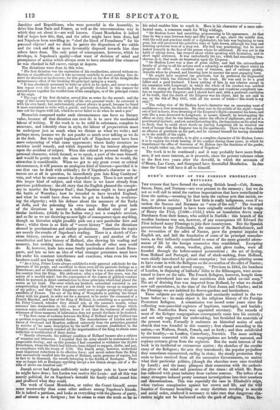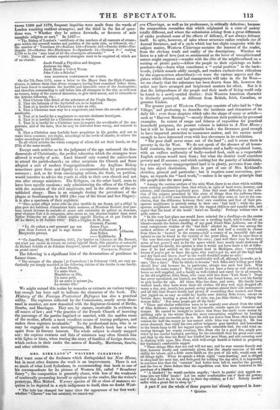BURN'S HISTORY OF THE FOREIGN PROTESTANT REFUGEES.
THE crosses that have formed the existing British breed—Celt, Roman, Saxon, Dane, and Norman—are ever present to the memory ; but we do not so well call to mind the various importations that have contributed to form the nation,—meaning by that term the various arts that enrich, re- fine, or please society. Yet how little is really indigenous, even if we reckon the Saxons and Normans as "sons of the soil." The worsted manufacture is supposed to have been originally established in the reign of Henry the First, (1100--1135,) when an inundation drove many Dutchmen from their homes, who settled in Norfolk : this branch of the woollen business was not, however, of any consequence till Edward the First induced many Flemings to join their countrymen. But the Spanish persecutions in the Netherlands, the massacre of St. Bartholomew, and the revocation of the edict of Nantes, gave the greatest impulse to English art, and laid the foundation of some of its principal manufac- tures, as they indirectly contributed to some of the more graceful adorn- ments of life by the foreign connexion they established. Excepting worsted, the silk, cotton woollen, glass, and glove trades, were all founded through the before-named persecutions - the art of dyeing, from Holland and Portugal, and that of clock-making, from Holland, were chiefly introduced by private enterprise ; but calico-printing seems to have come in with the Refugees on the revocation of the edict of Nantes ; as did ox-tail soup and stewed rumps. "Previous to 1685, the butchers of London in disposing of bullocks' hides to the fellmongers, were accus- tomed to leave on the tails. The French Refugees, however, bought them up, and introduced into use that nutritious dish called ox-tail soup." The art of draining fens was imported from Holland, by what we should now call speculators, in the time of the First James and Charles ; and to the Flemings we are indebted for flower-gardens and horticulture.
These subjects are only incidentally and succinctly noticed in the vo- lume Wore us : its main object is the religions history of the Foreign Protestant Refugees. A commission was issued some years since for collecting non-parochial registers of baptisms, marriages, and burials ; and Mr. Southerden Burn was appointed secretary. The records of most of the Refugee congregations consequently came into his custody ; and not only suggested the undertaking, but furnished the materials of the present work. Formally it embraces an historical notice of each church that was founded in this country ; first classed according to the nation,—as Walloon Dutch, French, and so forth ; and then subdivided by the locality,—as 'London Canterbury, Norwich. The more striking occurrences connected with the congregations are briefly narrated, and copious extracts given from the registers. But the main interest of the book is its incidental or extraneous matter : the sketches of the secular story of the Refugees ; the arts they introduced ; the popular prejudices they sometimes encountered, ending in riots ; the steady protection they seem to have received from all the successive Governments, no matter what their particular politics, (though the churches were once troubled by Laud); and the many glimpses their connexion with the authori- ties gives of the mind and practices of the times : all which Mr. Burn has collected with great industry from various sources. The influx of so many strangers induced pretty constant investigations into their numbers and denominations. This was especially the case in Elizabeth's reign, when various conspiracies against her crown and life, and the wild fanatics of Germany broaching so many doctrines revolting to morals and social order, rendered it necessary to take care that dangerous cha- racters might not be hiuboured under the garb of refugees. Thus, be-
tween 1560 and 1570, frequent inquiries were made from the wards of London touching resident strangers ; and the third in the list of ques- tions was, " Whether they be setters forwarde, or favorers of anie naughtie religion or Beet." In 1567— " he Bishop of London's certificate of the nombers of all manners of strann- gars within the several wardes and parishes of the saide citie, as followeth, ffie number of Venetians 10—Itallans 128—Frenche 512—Datche 2993—Por- tingalls 23—Skottes 36—Blackmors 2—Spaniards 54—Gretians 2—' making 3,760 to be the sum total of all the stranngers aforesaide." • • • "1581. Names of certain especial strangers meet to be enquired of, which are of no church: Jacob Powell a Physition and Surgeon. Ambrose his Man.
Jacob Hinek a Velvet Weyer.
John Coke a Scholar."
THE NORWICH CONFESSION OF FAITH.
On the 7th June 1575, came a letter to the Mayor from the High Commis- sioners, to inform them that divers strangers having been examined before them, had been found to maintain the horrible and damnable error of the Anabaptists; and therefore commanding ta call before him all strangers in the city, as well men as women, being of the years of discretion, to give their assent, and to subscribe to the Articles following, viz.: 1. That Chryste toke fietch of the substance of the Virgin Marye. . 2. That the infaunts of the feythefull are to be baptized.
. a. That yt is lawful for a Christian to take an othe.
4. That a Christian man may be a magestrate and beam the sworde of office of ittethorite. '
5. That yt is lawful for a magistrate to execute obstinate heretiques. 6. That yt is lawfull for a Christian man to warre. 7. That yt is lawful for a Christian man to require the awcthorite of the ma- gostrate, and of the lawe, that he may be delivered from wrong, and restored to right. • 8. That a Christian may lawfully have proprietye in his geodes, and not to make them common; yet owght, accordinge to the rewle of charite, to relieve the nedye accordinge to his habilitye. To all which articles the whole company of aliens did set their hands, on the 27th of the same month.
• Except such articles as in the judgment of the age embraced the fun- damentals of Christianity, the perfect toleration which the strangers were allowed is worthy of note. Laud himself only wanted the native-born to attend the parish-church; on other occasions the Church and State adopted a sort of modern Congregationalism. An Anglican Bishop sometimes gave force and dignity to excommunication by pronouncing sentence ; and, so far from encouraging schism the State, on petition, would interfere to advise the youth to stick to their own church and not run after strange ministers. The Refugees, on the other hand, seem to have been equally cautious ; only administering the offices of the Church with the sanction of the civil magistrate, and in the absence of the es- tablished clergy. Here is an example during the prevalence of the plague at Southampton in 1665 (the year of the Great and last Plague) : it is also a specimen of their registers.
"'Dieu ayant affiige mitre ville du plus terrible de sea fleaux, qni a oblige la plus part des habitans d'abandoner leurs maisons, et Monsieur Bemert, leer pas- tear, estant detenue de maladie et ayant este constraint de quitter sa demeure, changer d'air i la compagne' none evens en son absence baptise dans notre glise Francoise tin petit enfant anglois appelle Nicolas, et cc par fordre de Mr Le Maire, le 23 Jneillet 1665.' Faict a l'Eglise de St. Jean. Couraud, Pasteur.
"Le dit enfant a este presente par son James Page. pere Jean Fawcet et par la sage femme Aron Guillaumott. Marguerite provost. Jean Reline. — Baillehache. " Ce Jourd'huy, 26 Novembre, 1665, ray baptise en l'absence de Mr. Berriert, qui n'est pas encore de retour, un enfant appelle Marie, fillo putative et naturelle de Richert Schidle et de Jehanne Busgrove, ayant este presente an baptesme par sa grand mere.' COURAUD, Pasteur." The following is a significant hint of the devastations of pestilence in former times.
" The ravages of the plague [at Canterbury] in February 1582, are very pa- thetically yet simply recorded in the following entries of the deaths in one family. La fame Direlin,
• Un autre efant, Magdalene sa fine, Un autre petit, Et an autre le mesme jor, La dernier file."
We might extend this notice by remarks or extracts on various topics ; but enough has been said to indicate the character of the book. The History of the Foreign Protestant Refugees has also a practical utility. The registers collected by the Commission, nearly seven thou- sand in number, are now deposited with the Registrar-General of Births, Deaths, and Marriages. They are, by statute, receivable in evidence in all courts of law ; and "the practice of the French Church of inserting the parentage of the parties baptized or married, with the maiden name of the mother, affords a most excellent means of tracing pedigrees, and snakes these registers invaluable." To the professional man, who is or may be engaged in such investigations, Mr. Burn's book has a value apart from its literary interest. The whole subject is clearly mapped
out: the copious extracts and lists of ministers may often furnish him with lights or hints, when tracing the story of families of foreign descent, which reckon in their ranks the names of Romilly, Martineau, Saurin, and other celebrities. Diacres.



























 Previous page
Previous page